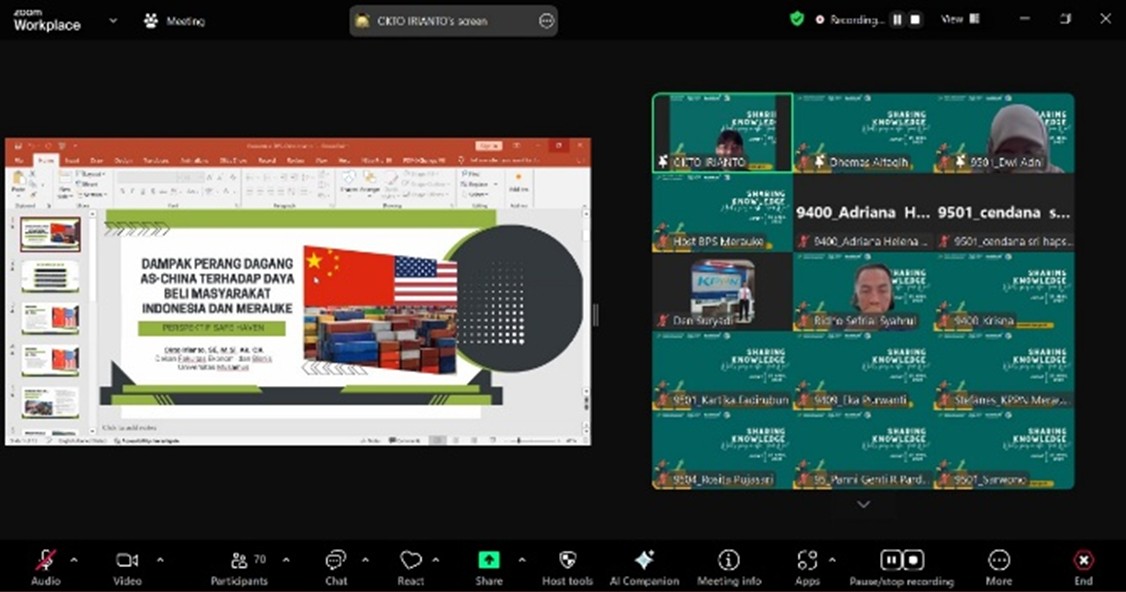Global macroeconomic capacity building program: Strengthening BPS Papua staff’s awareness of safe haven and trade war implications for the regional economy
DOI:
https://doi.org/10.53088/penamas.v5i3.2174Keywords:
Global Macroeconomics, Regional Economics, Statistical Capacity BuildingAbstract
This community service program aimed to enhance BPS Papua staff's awareness of global macroeconomic dynamics, specifically US-China trade war and safe haven phenomena impacts on regional economy. The program utilized survey method by virtual socialization using Zoom Workplace as platform on April 25, 2025, involving 96 participants from BPS Papua region including structural officials, heads of regencies/cities, functional statistical staff, and KPPN Merauke representatives in a 3-hour session consisting a 2-hour interactive presentation and a 1-hour open discussion. Evaluation was conducted through direct interviews and participation analysis. Results showed excellent engagement with 97% attendance rate, 23 questions during presentations, and 65 discussion contributions, indicating strong material relevance. Post-event interviews with 93 participants revealed 92% found the material highly beneficial for understanding global economic dynamics, with 89% confident in applying knowledge to routine data analysis. This initiative successfully demonstrated virtual learning effectiveness for capacity building in geographically challenging regions while establishing sustainable collaboration between Universitas Musamus and BPS Papua.
References
Botman, D. P. J., Carvalho Filho, I. E., & Lam, R. W. (2013). The Curious Case of the Yen as a Safe Haven Currency: A Forensic Analysis. IMF Working Papers, 13(228), 1. https://doi.org/10.5089/9781475513424.001
Boubaker, H., Cunado, J., Gil-Alana, L. A., & Gupta, R. (2020). Global crises and gold as a safe haven: Evidence from over seven and a half centuries of data. Physica A: Statistical Mechanics and Its Applications, 540, 123093. https://doi.org/10.1016/j.physa.2019.123093
Bragg, L. A., Walsh, C., & Heyeres, M. (2021). Successful design and delivery of online professional development for teachers: A systematic review of the literature. Computers & Education, 166, 104158. https://doi.org/10.1016/j.compedu.2021.104158
Chistruga, B. (2024). The Regionalization of Interdependencies in the World Economy. Competitiveness and Innovation in the Knowledge Economy, 2023, 275–282. https://doi.org/10.53486/cike2023.76
Duchateau, L., & Janssen, P. (2022). Two decades of statistical education collaboration in the global South: Lessons learned from an Ethiopian project and the way forward. Statistics in Medicine, 41(5), 845–846. https://doi.org/10.1002/sim.9293
Harmanci, H. (2024). Navigating Turbulent Waters in the US-China Trade War and the Role of BRICS in Shaping Global Dynamics. In Advances in Finance, Accounting, and Economics Book Series (pp. 237–274). https://doi.org/10.4018/979-8-3693-7393-4.ch008
Irianto, O., Manuhutu, F. Y., Ada, K. B., Adiatma, T., & Rachman, A. M. (2025). Factors Influencing Indonesian Accounting Students’ Perception of Safe Haven Investments. Jurnal Aplikasi Akuntansi, 10(1), 58–73. https://doi.org/10.29303/jaa.v10i1.651
Jäggi, A., Schlegel, M., & Zanetti, A. (2019). Macroeconomic surprises, market environment, and safe-haven currencies. Swiss Journal of Economics and Statistics, 155(1), 5. https://doi.org/10.1186/s41937-019-0031-9
Kuboja, J., & Mwakobela, U. (2024). The advancement of technology and the concept of distance learning in the global context: Reaching out the unreachable. Journal of Education For Sustainable Innovation, 2(1), 32–37. https://doi.org/10.56916/jesi.v2i1.805
Kurniawan, A., & Rizal Luthfi, K. (2023). Impact of the US-China Trade War on Foreign Trade of Emerging Economies: Brazil, South Africa, and Indonesia. Jurnal Ilmu Sosial Dan Ilmu Politik, 27(2), 157. https://doi.org/10.22146/jsp.69215
Liang, J. (2024). Enhancing Statistical Infrastructure to Improve Economic Census Efficiency. Proceedings of Business and Economic Studies, 7(5), 13–19. https://doi.org/10.26689/pbes.v7i5.8599
Nabixodjaev, A., & Muminov, A. (2022). Inflation: Analysis of External Factors. Economics and Education, 23(5). https://doi.org/10.55439/ECED/vol23_iss5/a4
Somyürek, S. (2012). Interactive Learning in Workplace Training. In Educational Stages and Interactive Learning (pp. 498–514). IGI Global. https://doi.org/10.4018/978-1-4666-0137-6.ch027
Sulistiyowati, L. N., & Pratama, S. V. (2023). Indonesia’s macroeconomic conditions during United States-China trade war. Jurnal Ekonomi Dan Bisnis, 26(2), 509–530. https://doi.org/10.24914/jeb.v26i2.6252
Yuliana, A. F., & Robiyanto, R. (2021). Peran Emas Sebagai Safe Haven Bagi Saham Pertambangan di Indonesia Pada Periode Pandemi Covid-19. Jurnal Ilmiah Bisnis Dan Ekonomi Asia, 15(1), 1–11. https://doi.org/10.32815/jibeka.v15i1.217
Zaw, W. M., & Hlaing, S. S. (2024). Bridging the Educational Gap: The Role of Digital Learning Platforms in Developing Countries. International Journal of Educational Development, 1(1), 11–15. https://doi.org/10.61132/ijed.v1i1.122

Downloads
Published
How to Cite
Issue
Section
License
Copyright (c) 2025 Okto Irianto, Cendana Murti Nuryana Sri Hapsara, Rafly Parenta Bano, Henie Poerwandar Asmaningrum

This work is licensed under a Creative Commons Attribution-ShareAlike 4.0 International License.
Authors who publish with this journal agree to the following terms:
The author(s) retain copyright and grant the journal the right of first publication with the work simultaneously licensed under a CC BY-SA 4.0 license that allows others to remix, adapt, and build upon the work even for commercial purposes, as long as they credit the author(s) and license their new creations under the identical terms.
License details: https://creativecommons.org/licenses/by-sa/4.0/


